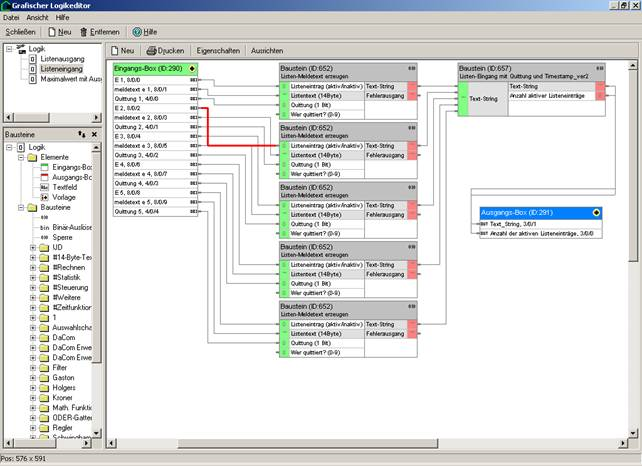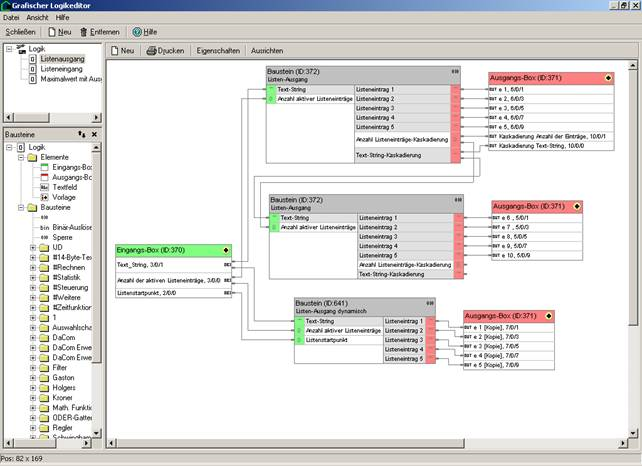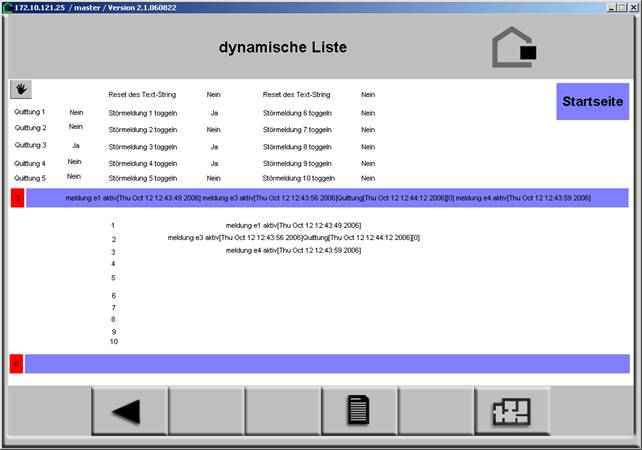1.Description
The modules create a dynamic list with time stamp and optional display of acknowledgement (with time stamp) and the information as to which user has acknowledged. The advantage of the list lies in the fact that the list only contains active entries. If a list entry is deleted, the other entries move up so that all entries are always listed directly under each other.
For larger lists, the "Create message text" module is connected in parallel to the "List input" module. The output modules are cascaded. As an alternative, the "List output dynamic" module can be used as an output module.
Acknowledgement is via a separate communication object and writes the object value of Input 3 Who acknowledges? (0-9)) in the list.
Figure 1: Circuitry of input modules

Figure 2: Cascading of the output modules or module output dynamic

Figure 3: Possible display within the visualisation

Recommendation: Have fault messages sent cyclically if the list is to be automatically filled again after restart.
For larger lists, the "Create message text" module is connected in parallel to the "List input" module. The output modules are cascaded. As an alternative, the "List output dynamic" module can be used as an output module.
Acknowledgement is via a separate communication object and writes the object value of Input 3 Who acknowledges? (0-9)) in the list.
Figure 1: Circuitry of input modules

Figure 2: Cascading of the output modules or module output dynamic

Figure 3: Possible display within the visualisation

Recommendation: Have fault messages sent cyclically if the list is to be automatically filled again after restart.
2.Inputs
| No. | Name | Initialisation | Description |
|---|---|---|---|
| 1 | List entry (active/inactive) | 0 | List input active/inactive (1=active, 0= inactive) With an edge change from 0 to 1, an entry with the text from Input 2 * time stamp is added at the end of the list. Example: Input e1 active[Thu Oct 12 15.46:30 2006] |
| 2 | List text (14 bytes) | "" | List text (14 bytes) The text adopted in the list is defined here and given a time stamp. Note The "[" character in the list text is not supported. Recommendation: Parameterise text as fixed text in the module. Texts can only be modified with an object value of 0 at Input 1. |
| 3 | Acknowledgement (1 bit) | 0 | Acknowledgement (1-bit) Acknowledgement = 1 The list entry is supplemented by the following entry: Acknowledgement[Thu Oct 12 15.56:30 2006][5] The new list entry looks like this: Input e1 active[Thu Oct 12 15.46:30 2006] acknowledgement[Thu Oct 12 15.56:30 2006][5] Recommendation: Set acknowledgement in HS automatically to 0 if list entry inactive! |
| 4 | Who acknowledges? (0-9) | 0 | Who acknowledges (0-9) If acknowledgement occurs via Input 3, the value of the input in the list entry is entered in the form [x]. |
3.Outputs
| No. | Name | Initialisation | SBC | Description |
|---|---|---|---|---|
| 1 | Text string | "" | s | Text string (14 bytes) for linking with the input Text string of the module 19039 |
| 2 | Error output | "" | s | Error output |
s = send, sbc = send by change
4.Other
| Recalculation during start: | No |
|---|---|
| Module is retentive: | No |
| Internal designation: | 19040 |
| Category: | List input + list output |